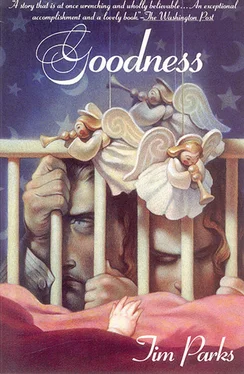I say no. The girl has been at death’s door all day. Severe spasticity. I dropped in on the way back from work and she was in an awful state. Shirley is barely sleeping. A consultant friend of her father’s says that all the anaesthetic involved in such a long operation could cause brain damage in a child suffering from nervous disorders. Even cerebral palsy.
One says these things so calmly. And as I speak I do feel peculiarly calm. BBC2 is ‘examining’ safety in the air in the eager way journalists will. Should we be allowed to buy duty-free drinks? This is a burning issue. I fix myself a short.
Mother counts her stitches. She says: ‘Perhaps it was wrong of us to agree to the operation. But I’d prayed about it so much.’
I have less trouble these days accepting the non sequiturs in my mother’s conversation. One waits a moment as if to let a smell disperse.
On EastEnders some money has been stolen and race prejudice is polluting the investigation. As well it might, frankly.
‘It’s so difficult to know what to do for the best,’ she sighs. She begins to hum, ‘Oh worship the Lord in the beauty of holiness,’ reminding me of odd smells in choir stalls and paper pellets chewed from the corners of hymn books. Perhaps she finds the language on EastEnders hard to take.
‘The doctors should have warned us. Charles was saying we should take them to court.’
‘I can’t quite see what that would solve.’
‘We might get some money.’
It is her turn to let a non sequitur pass. Fair enough.
ITV are showing a couple of hippos in the incongruous process of copulating. A regular evening’s viewing. I try:
‘He also said it might be better if she died.’
‘That kind of thing,’ she frowns at her pattern, ‘makes me very angry. You start with remarks like that and you finish up with Hitler and death camps. The little girl deserves to live as much as anybody else.’
It’s curious. I am simultaneously thinking that Charles is right, but that Mother is also right. Yet surely they can’t both be? Does the key lie in that word, ‘deserves’? And why is everybody else so sure of themselves, so well defined? While I flounder. The press have been going through a phase of admiring people who have the courage to help their old sick relatives over the great divide. Selection of pills. The right mix. Contact the Euthanasia Society.
Upset by this kind of talk, Mother goes to the kitchen and five minutes later brings me some tea and fruitcake. Her light, flowery dress is hung with careful looseness about her bulk, her shoes are flat and sensible. One knee is visibly swollen.
Snapping off the TV, I find myself saying: ‘How do you feel about your life, Mum?’
‘How do you mean, love?’ With a knitting needle she is scratching at the instep of a foot where veins bulge fiercely.
‘You grew up looking after Grandad and Mavis. Dad gets killed after you’ve been married just a few years. Then you spend the rest of your life slaving for Peggy and me and Mavis and Grandad and none of us were ever particularly grateful.’
‘What a grim way to look at it,’ she laughs. She seems not in the least perturbed by this, as she clearly was by the notion of mercy killing. ‘No, I’ve had a very rich life. God has been good to me. He gave me a small ministry. I’ve been able to pray and have fellowship with all kinds of people and there has always been just enough of this world’s goods. If you knew the number of times people have slipped things through the letterbox without leaving their names. It’s been a very fulfilling life.’
Getting excited, I say: ‘Yes, but Peggy and I didn’t exactly turn out how you wanted, did we?’
‘Oh, I don’t know. Peggy has this nice boy Barry. You’re happily married. I’m a grandmother twice over. What more could I want?’
Of course we both know very well what more. A great deal more. And yet I realise that this obstinately optimistic attitude is what I want to hear this evening. I want to hear my life described like this. And with tears suddenly in my eyes I find myself saying: ‘You know, if it hadn’t been for this awful business with Hilary, I would have loved to have had another child, more than one. What’s one earning money for after all?’
Have I ever articulated this view before? Even with myself. It’s perfectly obvious what one is earning money for: there’s so much still to buy.
Her knitting needles click along the edge of a silence now welling with unexplained emotion; evenly and determinedly: clickety click, click and click, clickety click, click and click. Then she stops. She looks up from a face that age has rather bloated. She says very calmly: ‘If you must know, dear, the one thing I regret in my life is the words they made me speak before they killed your father. I often wonder if they aren’t somehow to blame.’
We stare at each other, in some amazement that this has come out. As if a ghost (my father’s?) had crossed the room.
‘You what? To blame for what?’
She sighs over the crumpled knitting in her lap, not tearful as sometimes in the past, but with a weary ravaged softness about her roughly-shaped features under their helmet of grey hair.
‘For Hilary?’ I put incredulity into my voice.
Unable to speak, she nods.
I jump up. For reasons I don’t understand myself I’m quite ruthless. ‘Don’t be so bloody ridiculous, Mum!’ One thing I am not going to do is be lured into her metaphysical scheme of things. ‘You should see a psychiatrist. You know that? It’s mad to think that kind of thing. Mad.’ ‘Dear George,’ she’s muttering. ‘Dear George, I feel you’re so near, yet so far.’ ‘No,’ I say, ‘the only thing you did wrong,’ and I spit the words out, ‘if you must know, was not getting Mavis thoroughly checked out. Okay? That’s all there is to it.’ And I’m stamping over to the drinks cabinet with at least a quadruple whisky in mind, when the phone rings.
‘I’m bringing her home,’ Shirley says.
‘I’m bringing her home.’
‘What? She’s better?’
Shirley is urgent: ‘She’s dying. I think they’re trying to let her die here.’
I tell her not to be ridiculous.
‘We’ll need some oxygen. Apparently you can hire it. Check out the yellow pages.’
‘But Shirley.’
‘Do it. Now. I’ll be back in an hour or so. I’ll take a cab. I’ve already signed her out.’
‘Let me come and get you in the car.’
‘No. I’ve got to get out of here now. Please, George, get the oxygen.’
She hangs up.
Mother is blowing her nose, sorting out her eyes.
‘Shirley’s bringing her home,’ I say, rising as one does to the drama of the occasion. In fact, while things are dramatic, life’s generally plain sailing. I grab the yellow pages.
And so begins the great epic: the tiny baby running a high temperature, suppositories, constant changing of sheets, of clothes, of nappies, of dressings on her strange and butchered legs, constant forcing of bottles between clamped gums, followed by vomiting, contortions. Her skin is clammy with fever. She cries a shrill nagging cry. She fights, though ever more weakly, whenever she is touched in any part of her body, eyes almost always screwed tight, hotly red in the now wan wax yellow of her face. In her fits she will have respiratory crises which require the oxygen mask. An ear infection generates a constant flow of pus.
Grabbing a snack with Shirley in the early hours, perhaps the second night, or the third, while Mother watches over the girl, I say: ‘We should have left her in hospital. They have all the equipment there.’
The house breathes silently about us. A hundred and sixty grand’s worth now and going up around £50 a day. The kitchen curtains haven’t been drawn and the yellow overhead light is hard and cold on the marble black tomb slabs of the windowpanes. Shirley’s expensive pans are piled high in the sink. I stab at crumbs.
Читать дальше












